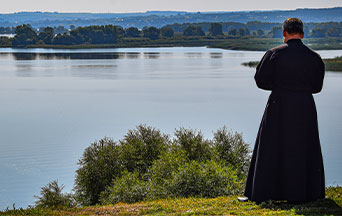
Dioceses across the country have long suffered from a vocation crisis. The number of new priests has failed to keep up as older priests retire and die. Many bishops have had to resort to foreign priests to fill the gap.
The crisis is far from over. However, something new is happening in the field. Some dioceses are experiencing a surge in new priests. This year, Milwaukee ordained an extraordinary class of nine priests. In Washington, D.C., the cardinal welcomed 16 new priests, the largest class in decades. Other dioceses report similar trends.
The profile of the new priests is also changing. They are young, confident and conservative. Their theology is orthodox, their liturgical tastes traditional and their politics lean right. They truly stand out since they do not want to adapt to the neo-pagan world but change it.
Eternal and Natural Law: The Foundation of Morals and Law
In an extensive article in The New York Times, religion reporter Ruth Graham describes the changes. Since the eighties, priests have been trending conservative. She quotes Brad Vermurlen at the University of St. Thomas in Houston, saying priests ordained since 2010 “are clearly the most conservative cohort of priests we’ve seen in a long time.”
The new priests are much more conservative than their progressive predecessors. Well over half of the priests ordained in the sixties described themselves as theologically progressive and politically liberal.
What makes this trend fascinating is that, according to progressive mythology, this is not supposed to happen. New priests should “progress” to be more liberal, not “regress” and remain less so.
However, this “regression” is happening. In a recent survey of 3,500 priests by Catholic University, more than 80 percent of priests ordained since 2020 described themselves as either theologically conservative or orthodox or very conservative or orthodox. Not a single recently ordained priest accepted the label of very progressive. Similar percentages were recorded describing the priests’ political leanings and liturgical tastes.
For all practical purposes, the progressive priest will soon be extinct, a fact that alarms the Catholic left.
However, the reason for the shift is simple. The newly ordained priests are frank in their opinions about why this is happening. The pseudo-pastoral approach of validating sin in the name of being pastoral does not work. People are looking for direction, even if it means facing the hard truth. The progressive way of soft-pedaling Church teaching is failing, and people are leaving the Church as a result.
The new priests believe they have the duty to confront the culture on homosexual acts, cohabitation and other hot-button sins. Many young priests say changes like the Supreme Court’s Obergefell decision imposing same-sex “marriage” on the nation shocked them into searches for the eternal truths that never change. They found traditional Catholic morality in this process.
Father Luke Strand, Milwaukee’s former director of vocations, also claims that young candidates “desire sacrifice; they desire to do something great with their lives.”
Another factor aiding this trend is better screening of candidates who must have psychosexual maturity to live celibate lives. A sensation of normalcy has entered into seminary culture after decades in the postmodern experiments that turbocharged the disastrous clergy sexual abuse scandals.
As a result, the new priests experience a fellowship with other young priests. They exude confidence as they face the challenges of pastoral work in a broken society.
 Learn All About the Prophecies of Our Lady of Good Success About Our Times
Learn All About the Prophecies of Our Lady of Good Success About Our Times
The new priests break all the progressive molds that call for a synodal church that not only repeats the errors that brought the Church to the present crisis but takes them to an even worse, more egalitarian level.
Despite the success of new vocations, progressives insist on following a failed model. The experience of America’s new priests shows that what attracts youth to the priesthood has not changed. Give them the chance to sacrifice their lives in Christ’s service, and vocations will flourish.
Photo Credit: © Ксюша Азикова – stock.adobe.com

